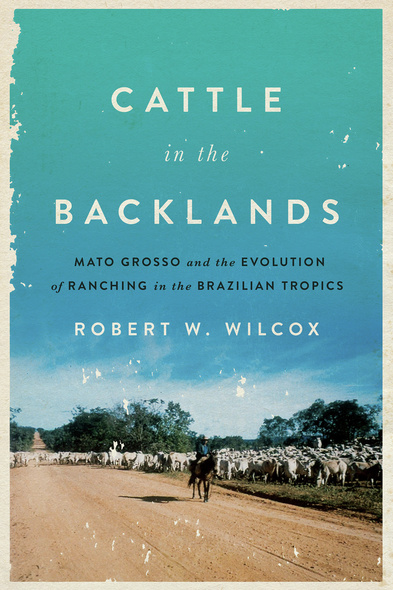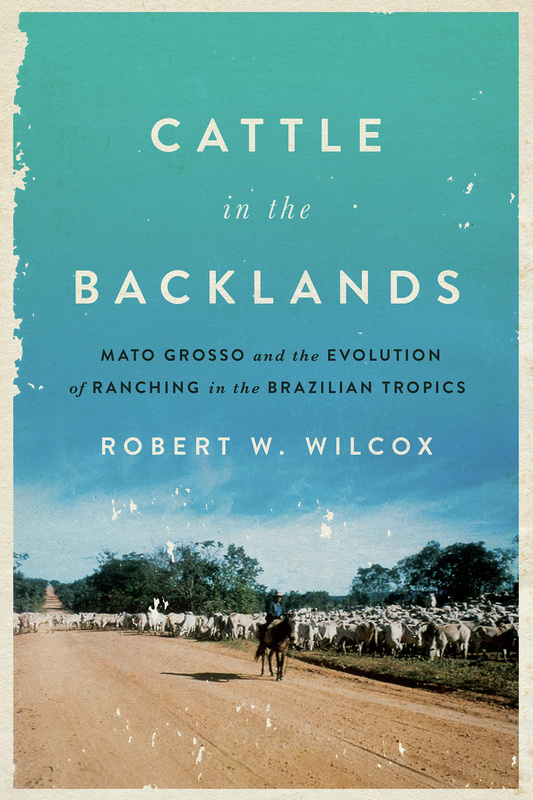Cattle in the Backlands
Mato Grosso and the Evolution of Ranching in the Brazilian Tropics
Henry A. Wallace Award, The Agricultural History Society, 2018
Brazil has the second-largest cattle herd in the world and is a major exporter of beef. While ranching in the Amazon—and its destructive environmental consequences—receives attention from both the media and scholars, the states of Mato Grosso and Mato Grosso do Sul actually host the most cattle. A significant beef producer in Brazil beginning in the late nineteenth century, the region served as a laboratory for raising cattle in the tropics, where temperate zone ranching practices do not work. Mato Grosso ranchers and cowboys transformed ranching’s relationship with the environment, including the introduction of an exotic cattle breed—the Zebu—that now dominates Latin American tropical ranching.
Cattle in the Backlands presents a comprehensive history of ranching in Mato Grosso. Using extensive primary sources, Robert W. Wilcox explores three key aspects: the economic transformation of a remote frontier region through modern technical inputs; the resulting social changes, especially in labor structures and land tenure; and environmental factors, including the long-term impact of ranching on ecosystems, which, he contends, was not as detrimental as might be assumed. Wilcox demonstrates that ranching practices in Mato Grosso set the parameters for tropical beef production in Brazil and throughout Latin America. As the region was incorporated into national and international economic structures, its ranching industry experienced the entry of foreign investment, the introduction of capitalized processing facilities, and nascent discussions of ecological impacts—developments that later affected many sectors of the Brazilian economy.
A welcome, and important, contribution…one of the best studies of the historic development of ranching in the American tropics.
Wilcox reveals the complex environmental, economic, and social history of one of the country's most important agricultural industries...Cattle in the Backlands provides a necessary, and previously under explored, history of a regional industry [and] is valuable reading for scholars of agro-industrial development within Brazil and beyond.
One of the most thoroughly researched histories of cattle ranching in Latin America written to date...this book is a welcome and much-needed addition to existing scholarship on cattle ranching in the Americas and will be of broader interest to agricultural, environmental, and social historians interested in understanding historical relationships between people, animals, and the land.
A significant achievement...Cattle in the Backlands helps us think more deeply about the importance of animals to peripheral economic development and about conditions in Brazil's many 'backlands' that faced similar struggles against distance, land-tenure insecurity, lack of credit, and physical environment.
This book fills a large hole in historical scholarship. English-language treatments of ranching history anywhere in Brazil are few and far between. It also makes a strong case for the importance of linking agro-pastoral studies to environmental specificity and to careful consideration of labor practices.
Ranching is deeply rooted in Latin American societies and cultures, but scholars and the general public often assume that the industry is backward and not a driver of economic transformation. This book undermines that assumption by calling attention to the internal and external forces that made cattle central to regional, national, and international economies
- Selected Timeline for Cattle Ranching in Mato Grosso, 1580s–1980
- Maps
- Preface and Acknowledgments
- Introduction. The Paradox of Tropical Ranching
- Chapter 1. Mirror of the Land: Regional Geography and Environmental Imperatives
- Chapter 2. Establishing Roots: The Ranching Economy to 1914
- Chapter 3. A Boom of Sorts: The Ranching Economy, 1914–1950
- Chapter 4. Land Access: Opportunities and Obstacles
- Chapter 5. Cowboys, Hands, and Native Peoples: Labor Relations
- Chapter 6. The Dynamics of the Mundane: Everyday Ranching
- Chapter 7. National Breeds and Hindu Idols
- Conclusion. Transformation and Continuity
- Notes
- Glossary
- Index






